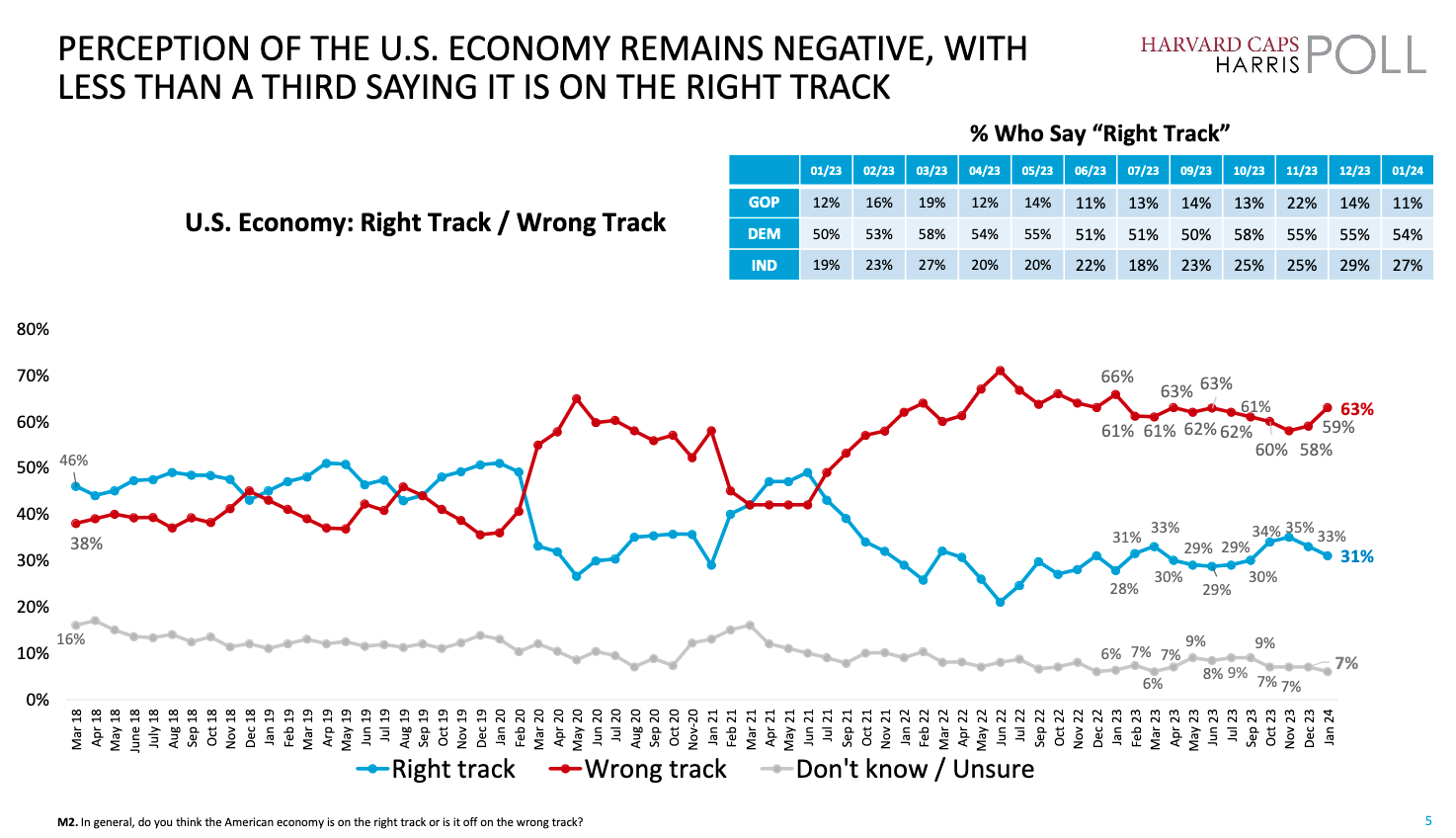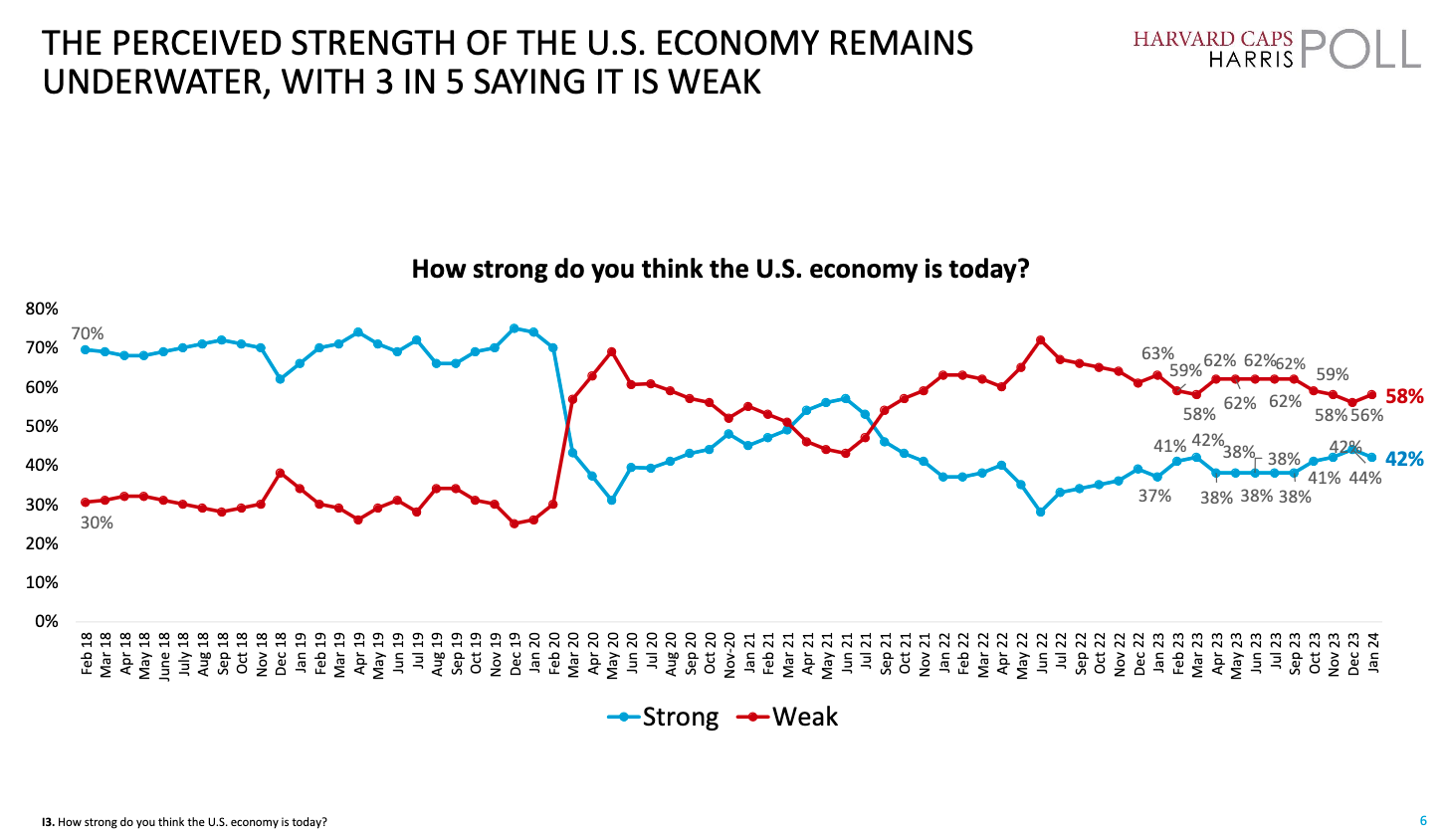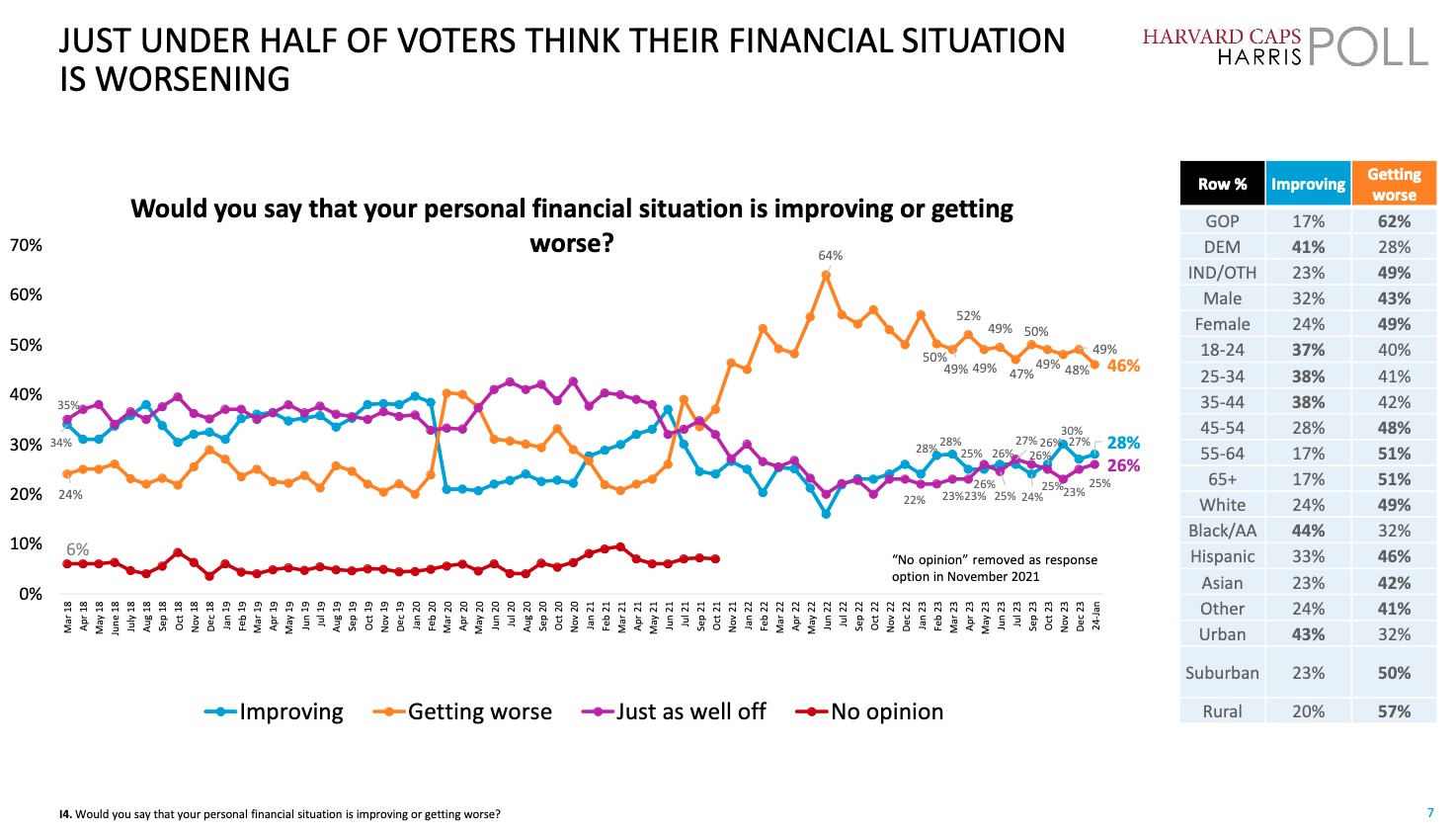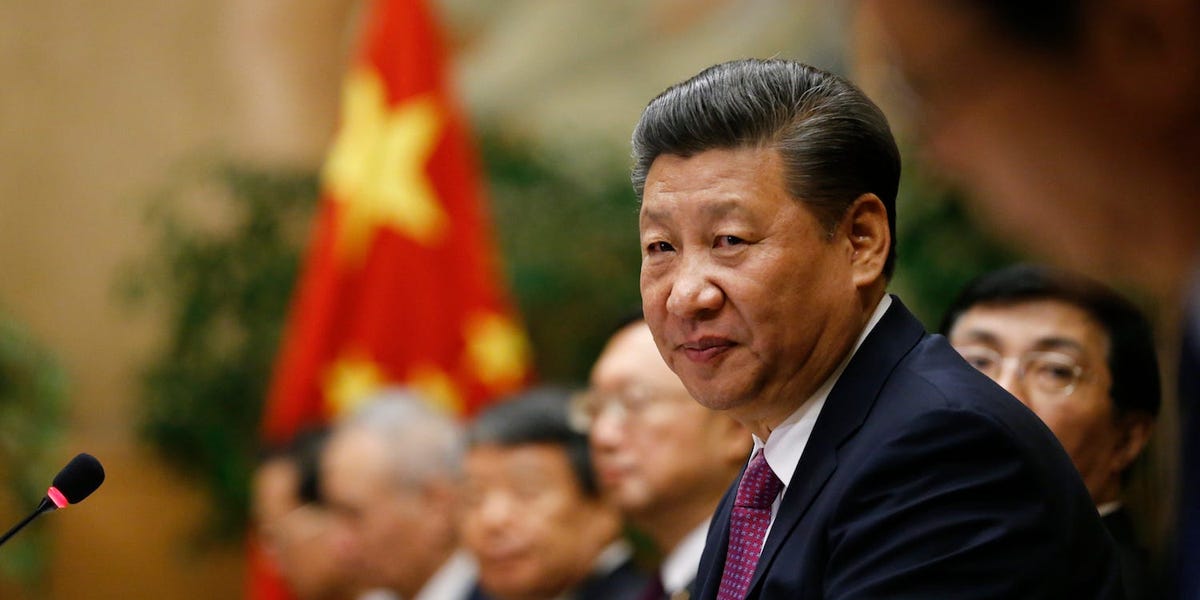Meanwhile, the US’s economists and their
propaganda ragspublications are screaming as loud as they can that the economy is great.And for some strange reason, no one believes them. Hmm!
Is Business Insider one of those rags? Their economy section looks generally apathetic if not negative for the US economy.
Remember what it was like 4 years ago? It’s better than that. A low bar, but they have a point 🤷
If by better you mean stock market is doing great then sure. However, actual economy that people are experiencing is far worse now.
Harvard CAPS / Harris Poll has conducted a poll of citizens in January, 2024. Among 2,346 respondents, 6 out of 10 people think the current path is wrong. What’s notable is that the percentage of “Democrats” who think the country is on the right track dropped over the month from 58% to 52%.
Perceptions of the US economy are also very negative at 63%. This is also one of the worst numbers in recent memory. 58% believe the US economy is weak right now.




https://harvardharrispoll.com/
and this article from Harvard gives a bit more insight into this as well https://news.harvard.edu/gazette/story/2023/11/why-americans-feel-inflation-economy-are-much-worse-than-they-are/
This is the best summary I could come up with:
Reports this week from The New York Times and The Wall Street Journal detail efforts by Chinese authorities to scrub the internet of negative takes on the state of its economy.
According to the NYT, The Ministry of State Security said in its official WeChat account that citizens should not believe the “false narratives” about the trajectory of China, and instead should believe in President Xi Jinping’s vision.
Meanwhile, officials continue to espouse an upbeat outlook for growth this year, even as the economy grapples with a cocktail of bearish headwinds including a troubled real estate sector, crashing stocks, deflation, and youth unemployment.
In one example cited by The WSJ, an article from a Beijing-based outlet that called for more direct state intervention in addressing economic challenges was erased from the website within hours of publishing.
That, too, disappeared shortly after it was published, and on WeChat, a message appeared to those trying to access it on Li’s account: “The content can’t be viewed due to violation of regulations.”
Experts have told Business Insider over recent weeks that the “uber-bearish” narrative on China has become entrenched, and that authorities have slim chances of engineering a rebound in the near term.
The original article contains 340 words, the summary contains 200 words. Saved 41%. I’m a bot and I’m open source!
Shocked! Shocked, I tell you. Well, anyway…
You know who else tried this? The rapist Brock Allan.
You mean Brock turner, the rapist.
1984 :"Who controls the past controls the future. Who controls the present controls the past.”

A significant part of the problem with bad economy is people’s sentiment, not actual, real resource constraints. If they don’t have the latter, (I don’t know if they do or don’t), scrubbing bad feels and limiting their spread makes sense and could have positive results. People aren’t known to spread only sentiments based on objective facts.
And if they do have the latter, then pretending everything is great rather than acknowledging it and taking steps to address it is a great way to make it worse.
Global North corporate media view China’s economy through a capitalist lens, so the reporting in question is garbage in the first place.
One example: China intentionally popped the real estate speculation bubble so that regular people can continue to afford housing. China hasn’t made the mistake that the US has: namely housing as an investment vehicle. And the Chinese state can do that because the capitalist class is not in control, whereas the US is an oligarchy. CBS: Homes “unaffordable” in 99% of nation for average American
Housing is the #1 investment in China by a long shot, what are you talking about?
Just because one’s house is one’s largest purchase doesn’t necessarily mean it’s an investment vehicle for which one can hope to get an 8% yearly return. China has a lot of public housing and is creating more, which in turn suppresses private housing prices. China to increase govt-subsidized housing in 2021-2025
I struggle to believe anything at face value the western media reports about China.
I struggle to believe anything China reports about themselves.
I guess it’s time to accept that we really don’t know fuck all about anything.
Honestly.
Chinese media has an agenda regarding China. Western media has an agenda regarding China.
Where am I supposed to get factual Chinese news, fuckin Douyu chat??
I mean you can look at the track record of different media publications and see which ones tend to be more realistic historically. That’s a pretty good predictor of which ones are going to give you a more accurate picture going forward. Western media reporting on China has been consistently wrong about pretty much everything for many decades now. Chinese media might embellish things, or downplay problems in China, but overall it appears to be far closer to reality.
I feel like the Chinese internet deserves its own name, such as “the chinanet”
It’s never that the other side is doing well, it’s always that they’re running propaganda.
“People in the ‘democratic republic of we-actually-care-about-our-people’ aren’t happy, that’s just propaganda” meanwhile they run bullshit “place where people are free and prosperous” maps which always look the fucking same no matter what it’s actually about.
#BidenomicsAreGoingGreat
So you decided to make a pro-China anti-US argument by linking to a flat-earther meme?
You alright there?
Removed by mod
kbin is not sending its best
Removed by mod
That’s a horrifying thought.
I for one, welcomes the end of “Collapse in x days !!!” videos.
This. The first time I saw one of those on the 'tube I thought “oh that’s interesting and also alarmist?” All it took was watching that one video and then my recommendations got flooded with more of the same. I didn’t know china doom was a whole ass genre on youtube.
They do have some weird fucking real estate shit going on, tho.
TLDR Chinese government clamped down on its real estate business corruption so that citizens could afford homes comfortably, and not end up with the kind of situation Western capitalist countries have.
anytime now
Let us give them benefit of the doubt on headline, and look at the article.
Reports this week from The New York Times and The Wall Street Journal detail efforts by Chinese authorities to scrub the internet of negative takes on the state of its economy.
According to the NYT, The Ministry of State Security said in its official WeChat account that citizens should not believe the “false narratives” about the trajectory of China, and instead should believe in President Xi Jinping’s vision.
Meanwhile, officials continue to espouse an upbeat outlook for growth this year, even as the economy grapples with a cocktail of bearish headwinds including a troubled real estate sector, crashing stocks, deflation, and youth unemployment.
CHEAP DEMORALISING CLICKBAIT!
I’m sure western bullshit about the Chinese economy is probably just being filtered as fake news, because it is.
Meanwhile the US National Security Advisor has admitted on multiple occasions that the Chinese economic model (market socialism and public ownership and investment into natural monopolies, a core tenet of SWCC) is more effective at economic growth than the American model (let Wall Street do whatever).
@knfrmity @RandAlThor
> market socialism
Chinese market “”“socialism”“” makes yugoslavia look like a bunch of dogmatic antirevisionists.What do they consider economic growth? When I think of American economic growth I think of oligarchs and capitalists living more extravagantly as they exploit more labor for their purposes.
I imagine stuff like this:
From 2010 to 2019 (the most recent period for which uninterrupted data is available), the income of the poorest 20% in China increased even as a share of total income. https://data.worldbank.org/indicator/SI.DST.FRST.20?end=2019&locations=CN&start=2008
By the end of 2020, extreme poverty, defined as living on under a threshold of around $2 per day, had been eliminated in China. According to the World Bank, the Chinese government had spent $700 billion on poverty alleviation since 2014. https://www.nytimes.com/2020/12/31/world/asia/china-poverty-xi-jinping.html
Over the past 40 years, the number of people in China with incomes below $1.90 per day – the International Poverty Line as defined by the World Bank to track global extreme poverty– has fallen by close to 800 million. https://www.worldbank.org/en/news/press-release/2022/04/01/lifting-800-million-people-out-of-poverty-new-report-looks-at-lessons-from-china-s-experience
China’s state-led economic development model and robust industrial policy has transformed it into what an influential European think tank calls “the world’s sole manufacturing superpower”, making up 35% of global gross production – more than the 9 next largest manufacturers combined. https://geopoliticaleconomy.com/2024/01/31/china-world-manufacturing-superpower-production/
A lot of this covers economic growth that I don’t think is really covered in the US. People making $7.25 in 2009 can very well be making $7.25 today as the minimum wage hasn’t gone up. Healthcare, education, and housing aren’t more obtainable now yet they are absolutely crucial for a society.
But when I hear “the economy” being talked about it’s either low unemployment (which is really just a survey of Americans on if they’ve applied for a job) or about stock values (which are predominantly owned by the very wealthy) going up.
What good is an economy if you can’t afford the things you need?
I get the impression that a lot of people in the west fundamentally fail to understand what the purpose of an economy actually is. An economy is a model for allocating labour and resources in a way that meets the needs of the people in the country.
The original argument for capitalism was that market economy with private ownership is the most effective way to allocate labour and resources in a way that benefits everyone. Measures such as jobs creation, the stock market, and GDP were meant to act as proxies for measuring how well the economy was accomplishing its stated purpose, which is to improve the standard of living for everyone.
Understanding that these metrics are simply proxies has been lost today, and they’ve been turned into goals of themselves. People have started treating these metrics as the economy. This is why we’re seeing an increasing disconnect between the economy that people are experiencing in their daily lives and news reporting on how the economy is doing.
And why we see absurd articles like this one arguing that the recession people are experiencing isn’t real.

https://www.wsj.com/economy/it-wont-be-a-recession-it-will-just-feel-like-one-1919267a
I get the impression that the difference in China is that the government does understand the purpose of an economy, and hence why we see different outcomes there.
Citations Needed podcast:
I’ll try to remember to listen to these but I get so scatter-brained I might forget. Thank you.
Removed by mod
“See? We’re reporting it”















